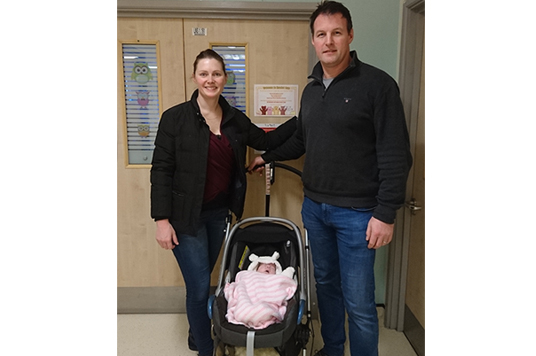St George’s operates on youngest ever patient
Surgeons at St George’s Hospital in London have operated on their youngest ever patient, who was born at just 23 weeks gestation and required emergency surgery when she was 6 days old and weighing only 609g (1.3 lbs).
Abiageal Peters was born extremely prematurely at St Peter’s Hospital, Chertsey in October last year before being transferred to the neonatal unit at St George’s Hospital for specialist care.
Six days later, she underwent major emergency surgery at St George’s to correct a severe condition of the gut affecting pre-term babies called perforated necrotizing enterocolitis, or NEC.
Abiageal had ruptured her intestine in three places and was extremely unwell. The surgery was successful and Abiageal is now doing well, having recently celebrated her original due date on 19 February.
Mr Zahid Mukhtar, Consultant Paediatric Surgeon, led the team that operated on Abiageal and believes she is the youngest patient to undergo and survive major abdominal surgery anywhere in the world.
“Abiageal is a unique case, and we only chose to operate because her chances of survival without surgery were so small. The fact she survived the operation – and is now doing so well – is fantastic news.
Mr Mukhtar continued: “We will continue to monitor her closely, but all the signs suggest we should be optimistic about her long-term prognosis. This is credit to Abiageal, her family, as well as the surgical, medical and nursing teams involved in looking after her”
Abiageal’s mother, Louise Peters, went into labour unexpectedly last October and, whilst she was able to deliver her daughter normally, Abiageal was immediately put on life support at St Peter’s, before being transferred to the neo-natal unit St George’s for surgery and subsequent specialist care.
The reason for the early labour is unknown as Louise was fit and healthy and had enjoyed a trouble-free pregnancy up to that point. Louise also has another daughter, Tara, who is now two years old. Her pregnancy with Tara was unproblematic.
Louise and husband David were able to spend a brief amount of time with Abiageal immediately after she was born.
Louise said: “Once the neonatal team had intubated Abi we were allowed a quick peek and a kiss before she was rushed off. It was incredibly scary and certainly not the birth we had been imagining. She just looked so tiny and couldn’t make any noise or open her eyes. It was hard to believe something that small could survive, but we knew the fact she was being whisked away meant there was a chance.”
After five days at St Peters, it became apparent that Abiageal was very unwell as she was slowly deteriorating. Louise adds: “The doctors suspected it may be a problem with her bowels as her tummy was turning black, but feared it could also just be a general shut down of her body, and that Abi might be giving up the fight.” She was transferred to St George’s immediately in case surgery was required.
Mr Mukhtar explained to Louise and David that surgery – whilst carrying a very high risk of death – was the only real option for her.
Abiageal was taken to the operating theatre and, during the operation, the surgical team opened Abiageal’s abdomen where three ruptures were found in her intestine, causing contamination and infection throughout her abdomen.
A section of her intestine was removed and her abdomen was thoroughly washed. At this stage a temporary stoma was created, which is much like having a colostomy bag. The surgery was extremely challenging for the surgical team, given how tiny and under-developed Abiageal’s organs were. The stoma was reversed 3 months later in another surgery that Abiageal is now fully recovered from.
The operation also had to be carried out very quickly to improve her chances of survival. The surgery itself took less than an hour and involved surgeons using specially adapted surgical equipment because Abiageal was so small.
Louise said: “We agreed to the operation, despite the risks associated with it, as we knew she wouldn’t survive without it. After she’d gone into theatre, Dave and I sat in a room for what was probably the longest 3 hours of our lives, waiting for the surgical team to tell us the outcome. When the door opened and one of the surgeons came into the room, we just looked at his face without hearing the words and we knew – she was ok. He was smiling.
She continued: “The surgery had gone as well as they could possibly have hoped and although they were still clearly anxious considering how young she was and how far she still had to go, her first big hurdle had been cleared. Our baby girl was a fighter. She stayed in intensive care for a while and overcame many more hurdles, but she kept fighting and we are so pleased with how she is doing today. She truly is our little miracle.”
Mr Mukhtar said Abiageal’s case was the youngest he had operated on and, according to the published literature and after speaking to paediatric surgical colleagues across the country, possibly the youngest anywhere.
He said: “The survival rate for babies born at 23 weeks is very low, and Abiageal’s case is remarkable in that sense. However, we are naturally pleased with the outcome and the decision we collectively made to operate, which is never easy and must always be made in the best interests of the patient and their parents.”
Notes to Editors
Photographs are available on request. For more information, please contact our press office on 020 8266 6128 or email Chris Rolfe, Associate Director of Communications (chris.rolfe@stgeorges.nhs.uk).


